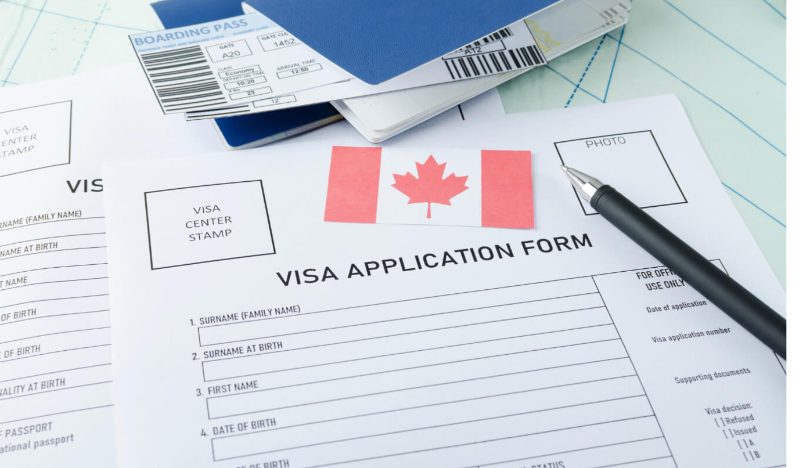Get free consultation
Fill out the form and we will contact you
Canada is always an ideal choice for many international students due to its excellent education system and attractive immigration opportunities after graduation. This article will help you explore the requirements, programs, benefits, and costs related to Canadian immigration for international students.
Immigrating to Canada as an international student is a valuable opportunity for students who have completed diploma, undergraduate, or postgraduate programs in Canada. The Canadian government allows international students to stay and work for 1 to 3 years, depending on the study program and the province where they studied. After completing at least one year of work in Canada, international students can apply for permanent residency through the work experience category. This is considered one of the most favorable immigration pathways for international students.
Immigrating to Canada as an International Student
However, each province in Canada has different immigration policies and programs. Therefore, international students need to thoroughly research the regulations and requirements of each province before embarking on their study journey in Canada or before deciding to settle permanently there.
To immigrate to Canada as an international student, you need to have an entry visa with the following conditions:
A graduation certificate or a completion certificate for a program in Canada.
A valid passport.
Proof of financial capability and academic ability to support your living expenses in Canada.
A medical examination to confirm you do not have any infectious diseases.
A clean criminal record, with no prior convictions.
Different provinces in Canada have specific requirements regarding the field of study and the duration of study to qualify for immigration. Therefore, you should carefully consider and choose a program that aligns with your immigration goals.
Some popular fields of study in Canada that you can consider include: engineering, agriculture, science, healthcare, and nursing. Choosing the right field of study will help you meet immigration criteria and open up good career opportunities in Canada.
International students can choose to immigrate to Canada through the Express Entry program of the Canadian government. This program primarily targets skilled workers with high qualifications, work experience, strong academic backgrounds, and proficiency in English (such as IELTS), along with other essential skills needed to integrate and work effectively in Canada. These factors help candidates adapt easily to the living environment and economy of the country.
Federal Immigration Program for International Students
Under the Express Entry program, international students can apply for immigration to Canada through three programs for skilled workers managed by the federal government:
Canada Experience Class (CEC): This program is for individuals who have at least one year of work experience in Canada and wish to become permanent residents after committing to live in a Canadian province for at least 5 years.
Federal Skilled Worker Program (FSWP): This program targets applicants with high skills and qualifications from around the world.
Federal Skilled Trades Program (FSTP): This program is for foreign nationals with skills and work experience in designated trades specified by the Canadian government.
Students should choose the program that best fits their occupation and personal circumstances. The Immigration, Refugees, and Citizenship Canada (IRCC) will assess applicants based on the Comprehensive Ranking System (CRS), scoring them on factors such as education, age, work experience, language ability, job offers from Canadian employers, and adaptability to life in Canada. After evaluation, IRCC will send Invitations to Apply (ITA) to eligible candidates. If your profile is in the Express Entry pool, you may also qualify for other immigration programs in Canada.
Ontario, which accounts for 51% of Canada's total GDP, is one of the most important regions in the country, home to the capital city, Ottawa. To immigrate to Ontario as an international student, you must meet one of the following conditions:
International students:
Have a full-time job.
Have completed at least half of your program.
Study at public universities or colleges.
Enroll in programs lasting 2 years or postgraduate programs.
International students in Master's programs:
Have graduated from a public university in Canada.
Have applied within 2 years of graduation.
Comply with all legal regulations in Canada.
International students in Pilot programs:
Study in the pilot program field.
Have certification in English or French.
Have a Master's degree from a public university in Ontario.
Have applied within 2 years of graduation.
Have sufficient financial means to support yourself and your family.
Plan to settle permanently in Ontario.
Have no criminal record in Canada.
To immigrate to British Columbia as an international student, applicants must meet one of the following two conditions:
Regulations for British Columbia Provincial Immigration for International Students
Applicants under the Post-Graduate Program:
Must hold a Master's or Doctoral degree.
Have studied for at least 2 years.
Currently working in fields such as science, health, agriculture, high technology, computer science, healthcare, physics, mathematics, etc.
Intend to live and work permanently in British Columbia.
No job offer required in Canada.
International Students Who Have Graduate:
Have graduated from a University, College, or hold a relevant certificate.
Have studied for at least 8 months.
Have a job in British Columbia.
Intend to live permanently in Canada (excluding Quebec).
The Alberta Immigrant Nominee Program (AINP) includes two main streams:
For International Students Who Have Recently Completed Their Studies: This stream is for international graduates from Canadian colleges or universities who have received a long-term, full-time job offer from a company or business in Alberta. Both the student and the employer must meet specific requirements to apply for permanent residency under this stream.
For International Students Who Have Graduated in the Province and Are Currently Working in Alberta: This stream is for international students who completed their studies at a college or university in Alberta and are currently working in the province under a work permit.
Conditions for International Students under the Alberta Immigration Program:
Must be enrolled full-time in eligible institutions in Alberta (study duration between 2 and 4 years)
Must have a diploma and a work permit
Must have an IELTS score of at least 5.0
Must have at least 30 hours/week of full-time work experience related to the field of study
Work experience must last at least 6 months
The Alberta Immigrant Nominee Program (AINP) includes two main streams for international students:
For International Students Who Have Recently Completed Their Studies: This stream is for international graduates from Canadian colleges or universities who have received a long-term, full-time job offer from a company or business in Alberta. Both the student and the employer must meet specific requirements in order to apply for permanent residency under this stream.
For International Students Who Have Graduated in the Province and Are Currently Working in Alberta: This stream is for international students who have completed their studies at a college or university in Alberta and are currently working in the province under a work permit.
Eligibility Requirements for International Students under the Alberta Immigration Program:
Must have studied full-time at eligible institutions in Alberta for a duration of 2 to 4 years.
Must have a diploma and a work permit.
Must have an IELTS score of at least 5.0.
Must have at least 30 hours per week of full-time work experience related to the field of study.
Work experience must last for at least 6 months.
The Saskatchewan Experience Category immigration program is designed for students who have graduated from post-secondary programs in Canada. To be eligible for this program, candidates must have a full-time job offer from an employer approved by the Saskatchewan province.
Full-Time Job Offer Must Be Approved by the Province
The application process includes the following steps:
Employer: The business in Canada must register on the Saskatchewan Immigrant Nominee Program (SINP) website to be approved by the Saskatchewan province.
SINP Approval: Once the business's offer is approved, the provincial government will send you an approval letter for the full-time job offer.
Submit Application: You can use this approval letter to submit your permanent residency application to the SINP.
The New Brunswick Provincial Nominee Program for skilled workers, especially for graduates from New Brunswick, requires students to meet the following conditions to apply for permanent residency under the New Brunswick Skilled Worker Program:
Age between 22 to 25.
IELTS score of 6.0 or higher.
Official employment in New Brunswick or owning a business for at least one yea.
Minimum 50 points in the New Brunswick Immigration Department's evaluation system, with a maximum score of 78.
For the “Skilled Worker” category of the immigration program, there are three score levels with specific requirements:
Minimum 51 points:
High school graduation in Vietnam.
Studying in New Brunswick.
at least one year of work experience (ages 22 to 24).
Minimum 54 points:
University graduation in Vietnam.
Two years of study in New Brunswick.
One year of work experience (age 26).
Minimum 50 points:
University graduation with four years of work experience in Vietnam.
Two years of study in New Brunswick.
Employment in New Brunswick (no specific work experience required, applicants aged 28 and older).
The Postgraduate Training Program of Prince Edward Island for international students requires candidates to have a job offer in a field related to their studies. To qualify for this program, students must meet the following conditions:
Graduate from a postgraduate program in Prince Edward Island.
Have a job offer in a field related to their studies in the province.
The job offer must be from an eligible employer and the position must be aligned with the student’s field of study. This ensures that the student can apply their acquired knowledge and skills to practical work and supports the process of long-term settlement in Prince Edward Island.
Newfoundland and Labrador offers two forms of immigration for graduates:
Immigration Program in Newfoundland and Labrador
Option for graduates from any university or college in Canada:
Students must meet the program requirements or have received a job offer from an employer in Newfoundland and Labrador.
The job must be in the student's field of study and could potentially be a long-term employment opportunity.
Entrepreneur Immigration Option:
This option is for graduates from the province who plan to establish and operate a business in Newfoundland and Labrador.
Applicants need to have a detailed business plan and financial capacity to develop the business in the province.
To qualify for the student immigration program in Nova Scotia, candidates must meet the following requirements:
Age between 21 to 55.
Full-time employment in Nova Scotia, with a minimum of 30 hours of work per week.
At least 1 year of work experience in a related field (work experience outside Canada may be considered).
Minimum 6.0 IELTS score in English.
A diploma or higher qualification (if the qualification is not from Nova Scotia, it must be from a province with equivalent educational standards)).
Intention to reside permanently in Nova Scotia, evidenced by studying and working in the province.
Preference is given to occupations in NOC groups O, A, B. For jobs in NOC C, applicants need at least 6 months of work experience.
Quebec is a leading hub for education in Canada, known for its prestigious universities and multilingual training programs for international students. Some of the top universities in the province include:
Quebec is Home to Many Prestigious Universities
McGill University: Known for its high-quality programs and diversity in fields of study, McGill University consistently ranks among the top universities in Canada and globally.
University of Montreal: Offering a wide range of programs and research opportunities, the University of Montreal is one of Quebec's leading educational institutions, with strengths in many research areas.
Laval University: Renowned for its excellence in education and research, Laval University is one of the oldest universities in Quebec, offering programs in both French and English.
When settling in Canada, you and your family will enjoy many valuable benefits and rights, including:
Freedom to live and work: You can work at any company within the country or start your own business.
Visa exemptions or easy visa access: You can easily apply for a visa to visit most other countries.
Family sponsorship: You can sponsor your relatives to come and live in Canada.
Child benefits: Children of permanent residents receive cash benefits until the age of 18.
Benefits for seniors: You will enjoy social benefits upon retirement.
Lower tuition for children: Children of permanent residents can study for free or at a low cost from elementary through high school.
Healthcare system: Your family will have access to Canada's healthcare system, with the government covering most medical costs, including emergency care, regular check-ups, vaccinations, and other services.
Preferential interest rates: You may receive preferential interest rates when taking out loans to buy a house or a car.
Opportunity for citizenship: You have the opportunity to apply for citizenship and become a Canadian citizen.
If you have high-level skills, are proficient in English, and have thoroughly researched and prepared your immigration documents, you can apply independently without consulting services. In this case, the costs involved are:
Application fee: This is the fee for submitting your immigration application, which generally covers the review of your documents and processing of your request.
Government agency fees: These fees can include the visa application fee, medical exam fee, police clearance certificate fee, and other fees related to the immigration process.
While preparing and submitting your application independently can save you money compared to using consultancy services, it requires you to be careful and ensure that all documents and information provided are accurate and complete.
The cost of living in Canada can be relatively high, depending on the area in which you live. To prepare your finances properly, you should calculate the following basic expenses:
Living Costs in Canada Can Be High
Accommodation: Costs for renting or purchasing property. Prices can vary significantly between cities and provinces, with major cities like Toronto and Vancouver typically having higher rental costs.
Food and Household Items: The cost of daily groceries, household items, and other necessities. Prices can also vary depending on the region and type of product.
Transportation: Costs for commuting, including gas, vehicle maintenance, or public transportation fares. This can be high if you live in large cities with an extensive public transportation system.
Childcare: The cost of daycare or child care if you have young children. In some cities, daycare fees can be very high, so it's important to carefully budget for this expense.
You should also plan for occasional costs such as health insurance, entertainment expenses, and other emergency costs. Proper financial preparation will help you adapt more easily to life in Canada.
In addition to living costs, you will need to prepare for tuition fees when studying in Canada. Below are estimated tuition fees for different education levels:
High School: Approximately $7,700 – $26,800 CAD per year, depending on the school and province.
College: Approximately $6,800 – $11,500 CAD per year, with fees varying based on the program and educational institution.
University: Around $19,300 CAD per year, though tuition fees can differ between schools and programs.
Postgraduate: Around $12,450 CAD per year, with fees varying depending on the program and institution.
Immigrating to Canada as an international student is an attractive option for those looking to build a new life in the country. With access to high-quality education and the opportunity to achieve long-term goals, studying abroad not only opens doors to academic opportunities but also the chance to settle in Canada.
If you need more detailed information about other immigration programs or require specific consultation, feel free to contact Second Citizenship. We are ready to assist you in finding the best program to help you achieve your immigration goals in Canada.
Fill out the form and we will contact you







